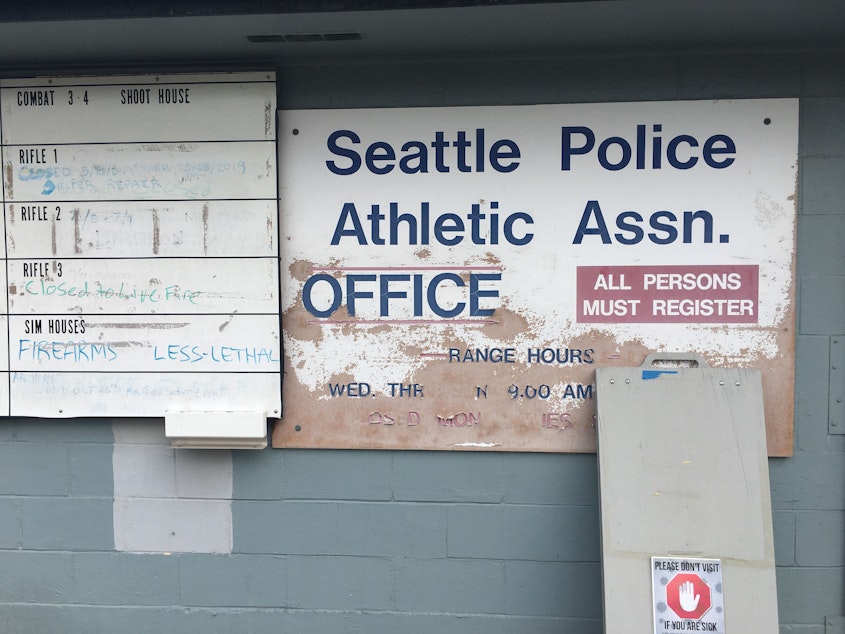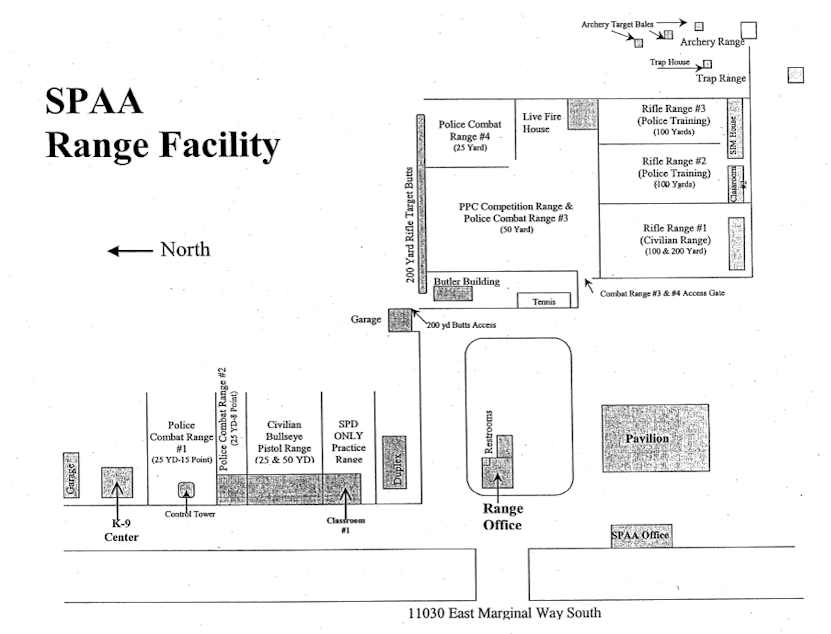ICE has spent almost $175K at a Seattle Police firing range

Since 2004, federal records show the Seattle Police Athletic Association has received $158,955 from U.S. Immigration and Customs Enforcement for use of its firing range and facilities. While the contracts don't violate any laws, it speaks to the tangled relationships between local governments, law enforcement, and the feds -- and of the murky boundaries of where one power ends and another’s responsibility begins.
In the Duwamish Valley, tucked between I-5 and state route 599, sits the Seattle Police Athletic Association.
Near the entrance is a shabby, gray kiosk where members can purchase equipment. The association boasts three ranges for rifles, pistols, and archery; a 10,000-square-foot pavilion that families rent out for quinceañeras and weddings; parking space for RVs; and a picnic area for barbecues.
The facilities are owned and operated jointly by the Seattle Police Athletic Association and the Seattle Police Department, according to their website. The athletic association is a non-profit and a separate organization from Seattle Police; but its officers are on the board of directors and part of the adjacent property is owned by the City of Seattle.
The athletic association has been around since the 1940s and has an estimated 1,000 members, mostly law enforcement from around the Puget Sound area. Part of the range is available to civilians; another section is just for police.
Since 2004, federal records show the Seattle Police Athletic Association has received $158,955 from U.S. Immigration and Customs Enforcement for use of its firing range and facilities -- not a monumental amount, but the contracts have risen steadily each year. The latest contract between ICE and the athletic association is set to expire in July of 2021, with another $17,000 potentially coming into the organization.
Police departments have been under intense scrutiny of late. Killings of Black Americans have led to months of protests this year. Some criminal justice activists also connect the systems of incarceration in the U.S. to those that detain and deport immigrants -- pointing out that it’s largely a civil offense and not a criminal one to be undocumented.
In an attempt to examine connections between local law enforcement and immigration agencies, KUOW looked into ICE officials training at the same facilities as Seattle police.
In an email to KUOW, Tanya Roman, a spokesperson with ICE said, “Homeland Security Investigations special agents and Enforcement and Removal Operations deportation officers require routine firearms qualifications to safely execute their law enforcement missions.”
ICE declined to share details of the kinds of training or number of officers that use the facilities, “due to operational security.”

The current athletic association president is Officer Steven McNew, who was one of two officers involved with the death of Charleena Lyles in 2017. A judge dismissed claims for wrongful death and civil rights.
He declined an interview but responded with a statement over email.
“The SPAA is a private, non-profit, members only facility for recreational shooting sports, and other athletics. Our members are comprised of individuals from many professions, both LE [law enforcement] and Civilian.
We are independent of the SPD and any other governmental agency and we do not comment on individual members or their status.”
The Seattle Police Department public affairs team did not provide comment with their relationship to the athletic association.
A staff member from the Seattle Office of Immigrant and Refugee Affairs however, was surprised to learn these contracts exist.
Likewise, two Seattle Police Department officers KUOW contacted were not aware that the athletic association rented out the firing range to the federal agency. But they also weren’t shocked; it’s the closest outdoor range of its size in Seattle and anyone can theoretically rent the facilities. In the past, ICE has rented with the Black Diamond Gun Club and the Bellevue Gun Club but those are private businesses not associated with law enforcement or city property.
Seattle and King County have been clear about limiting the relationship between local law enforcement and federal immigration officials. Currently, there’s a county ordinance that prohibits local law enforcement from cooperating with immigration officials.
Likewise, the state’s Keep Washington Working Act passed in 2019 also stops law enforcement from asking an individual's citizenship status or notifying ICE when they do detain a non-citizen.
Whether the contracts between ICE and the athletic association are legally permissible is not the point of contention -- rather it speaks to the tangled relationships between local governments, law enforcement, and the feds, and of the murky boundaries of where one power ends and another’s responsibility begins.
Enoka Herat works at the intersection of immigration and policing for the American Civil Liberties Union in Washington.
For her it’s clear that while this relationship is not prohibited, it is troubling,
“SPD is not required to allow ICE use of their facilities - it is a choice,” she said over email. “SPD has made a choice that compromises the values of the city they serve.”
This situation rings similar to the debacle between King County’s Boeing Field and ICE Air. Last year, King County officials effectively banned deportation flights by changing lease agreements with airport operators. That ended up in a legal battle between the county and feds that is still playing out now.
Herat adds that relationships like this one can impact the thinning faith immigrants and communities of color have in police.
“Granting ICE access to city-owned facilities doesn’t serve our city. It serves the federal immigration enforcement agenda at the expense of Seattle's residents, especially the noncitizens in our communities, because it brings ICE agents into the city, increases fear and undermines trust.”
Have a news tip or want to share feedback? Reach reporter Esmy Jimenez at esmy@kuow.org or 206-565-7902 (Signal & Whatsapp)




